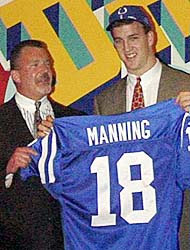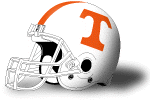

 |
 |
 |
|
INDIANAPOLIS (Oct. 3, 1998) -- Peyton Manning has thrown exactly 11 more interceptions than temper tantrums during his first month as a professional quarterback.
Ryan Leaf unofficially has launched more obscenity-laced missiles at the media than touchdown-producing spirals at the opposition. Two NFL neophytes with disparate ways of handling the rough spots in high-profile careers will take their latest step in unison today at the RCA Dome. Manning, the first pick in the NFL draft and the 22-year-old quarterback of the Indianapolis Colts, has reacted to his adversity -- a league-high 11 interceptions and an 0-4 record -- with poise on the field and politeness off it. Leaf, 22, the No. 2 pick in the draft and the future of the San Diego Chargers, has reacted to his 11 turnovers -- including four interceptions last week that led to him being benched -- with salty exchanges with the media and subsequent apologies that have seemed more contrived that contrite. Dr. John Kremer, a clinical psychologist who teaches a sports psychology class at IUPUI, has never met Manning or Leaf. But he isn't surprised that Manning has reacted to the adversity with tenacity rather than a tantrum. "Knowing what I do of his situation, Peyton Manning comes from a high pedigree -- his father (Archie), his experience at college," Kremer said. "Because of that background, he is handling this as good as you could expect anybody to handle the situation. "If you listen to him, he seems very, very calm. On the other hand, Ryan Leaf seems much more easily ... physically aroused. And whenever you get physically aroused, it has a tendency to interfere with your judgment." Manning, Kremer said, apparently has come to grips with the realization that short-term struggles can be replaced by long-term success only through preparation and persistence. Kremer isn't certain Leaf is as far-sighted. "Ryan Leaf seems to be falling apart," he said. "He may have had this idyllic image of himself and that image has fallen apart and he doesn't seem to be dealing with it very well." Anyone waiting for Manning to suffer a similar meltdown may be in for a long wait. "It's not going to happen," said former Colts' quarterback Bert Jones, the No. 2 pick in the 1973 draft and a close friend of the Mannings. "He's the only kid I know that doesn't have a chink in the armor. And that goes back to both parents, Archie and Olivia." Even so, there is debate whether the short-term failures of Manning and Leaf will affect their ability to achieve long-range success. Some quarterbacks, the notion goes, never recover after having their confidence shaken on a weekly basis. "Sure, it can ruin him," said Jack Trudeau, who was thrust into the Colts' lineup as an unprepared rookie in 1986. "You've got to have the ability to bounce back and not let the doubts creep in and overwhelm you." Jones acknowledged he was shell-shocked as a rookie and, after starting from the outset, was benched in favor of veteran Marty Domres. But he and former New York Giants quarterback Phil Simms believe tough times are the proving grounds for elite quarterbacks. Jones recovered from his horrendous start -- 12 interceptions, four touchdowns and a 28.8 quarterback rating in five starts -- to lead the Colts to consecutive playoff appearances in 1975-77. Simms pointed to Dallas quarterback Troy Aikman, who was 0-11 as a rookie in 1989 and won only three of his first 21 starts. From 1992-95, Aikman led the Cowboys to three Super Bowl titles. "The idea you're going to hurt a guy's mental makeup is B.S.," said Simms, an analyst for CBS who led the Giants to a victory in Super Bowl XXI. "If the guy is going to be a franchise quarterback, he will come through this and be better because of it." New England quarterback Drew Bledsoe, the No. 1 pick in 1993 and like Leaf a product of Washington State, believes Manning and Leaf soon will find themselves at a physical and psychological fork in the road. "How they deal with the adversity they're going through now is going to be a determining factor for both of them," he said. "They can bounce back from it, be a little patient, maintain their confidence, move on and be ultimately successful." "I don't think I need much damage control," Manning said. "My confidence is just fine. Every time we struggle makes me that much more determined to come back the next week and become a better player." His public persona of an unruffled rookie, Manning said, camouflages a player desperately trying to navigate unchartered waters. After having never lost consecutive games in high school or college, Manning now is mired in a four-game losing streak. After setting an NCAA record for lowest interception percentage while at the University of Tennessee (33 in 1,381 attempts), he is on pace to surpass George Blanda's 36-year-old record of 42 interceptions in a season. Not bothered by it all? Are you kidding? "I may appear even-keeled," Manning said, "but I'm dying inside. I can't stand to lose, and the interceptions are eating me alive." |